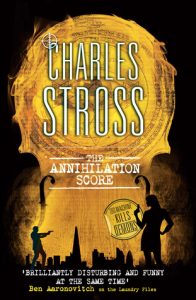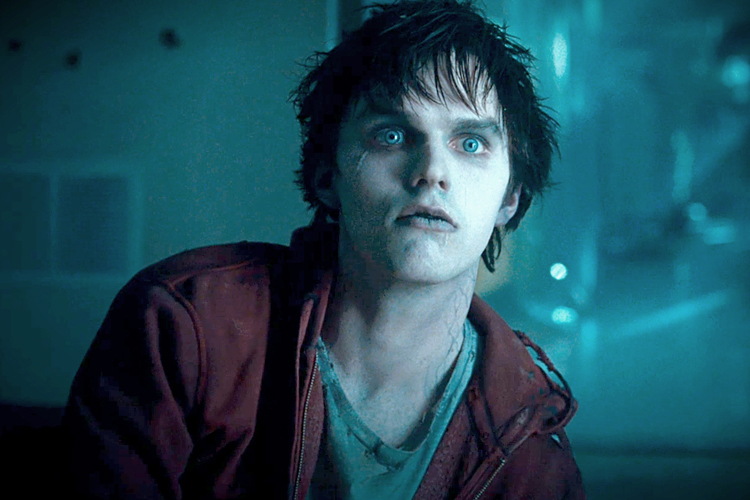 The great thing about writing a series of novels is that, if your original idea is flexible enough, you can throw just about anything you want into them (which, when you think about it, is a good way of keeping a series fresh).
The great thing about writing a series of novels is that, if your original idea is flexible enough, you can throw just about anything you want into them (which, when you think about it, is a good way of keeping a series fresh).
Take Charles Stross’ Laundry series, for example. The books combine occult horror with science fictiony concepts such as advanced computation, all held together with a wicked sense of humour (usually at the expense of bureaucracy – his Laundry novels are the 21st century’s answer to Keith Laumer’s Retief stories). So, one day, Stross must say to himself, “You know, I’d really like to write a novel about vampires.” And he writes The Rhesus Chart. A year later, he must say to himself, “You know, I love superheroes. I should really write a novel featuring them.”
And that’s how we get The Annihilation Score.
The Annihilation Score has all of the strengths of the series (well drawn characters, smart plot, hilarious scenes and dialogue), plus a surprising (inasmuch as it hasn’t occurred in any of the previous books) weakness. I have long had the impression that Stross has a tremendous amount of fun writing the Laundry books, so even with its problems this is a very enjoyable read. To encounter Stross at his best, though, I wouldn’t recommend readers new to the series start with it.
Stross does some cool new things in The Annihilation Score. For one, he switches up the book’s point of view: in the previous novels, we watched Bob Howard work his way up the ladder of the Laundry as the occult challenges he had to face became increasingly dangerous to him and the world. In The Annihilation Score, the main character is his wife, Dominique “Mo” O’Brien, who is also a Laundry agent. This allows Stross to do a bravura bit of writing: The Annihilation Score begins before the end of the previous novel, allowing us to relive the final scene of that book from Mo’s point of view instead of Bob’s.
It’s brilliant.
The basic idea behind the novel is that increasing leakage between our universe and realms of Chtuluian horrors is causing ordinary human beings to gain extraordinary powers. Those who gain powers (as well as the public in general) tend to see powered people as superheroes or supervillains; the government decides to let this interpretation of events stand, since the general public isn’t aware of how reality is breaking down. Stross, a very smart writer, has found a successful way to rationalize the existence of people with powers in his Laundry universe.
And he’s clearly having fun with the concept, creating characters like The Mandate (whose power is to convince people to do what he wants – how could such a character not have political ambitions?), The Bee (a small woman who – what else? – moves very quickly) and Officer Friendly (a sort of Superman in a policeman’s uniform). This is on top of the usual humour at the expense of large government bureaucracies (in this case, shooting a little higher, different ministries within the British government, including the Home Secretary, and a national organization of police chiefs). By the end of the book, the infighting between different government departments to determine who will handle “the superhero problem” alone is worth the price of admission.
Fun.
Lots of fun.
But.
It is obvious within the first 150 pages what the main villain is after. That’s 250 pages before the end of the book. Not only that, but Stross foreshadows the ending at around the 200 and 300 page marks, reminding an astute reader of this obvious bit of plotting; it is as though he deliberately wants the reader to be ahead of the main character. I imagine that we’re supposed to believe that the rush of events keeps Mo from putting the pieces of the puzzle together, but, it just made me question her intelligence (which is most emphatically not what you want a reader to do).
In addition, although the conception of the villain, when it was revealed, came as both a surprise and made chilling sense, it didn’t quite explain all that had come before it. A lot, but not all. For example: a villain with powers who is captured early in the book seems to not be acting completely of his own volition. Yet, the ultimate villain does not have any special power to compel people to act. In fact, as far as I can tell, the earlier villain’s relationship to the main villain is never referred to after the major reveal of the latter’s identity, much less explained. Considering how meticulous a plotter Stross usually is, this is an unexpected oversight.
Overall, The Annihilation Score is a highly entertaining novel; fans of the Laundry will be very pleased with it (I know this one was). I just wish a little more care had been taken with the plot.











Its possible he was planting seeds for delerium brief, which pulls a lot of his loose threads together…